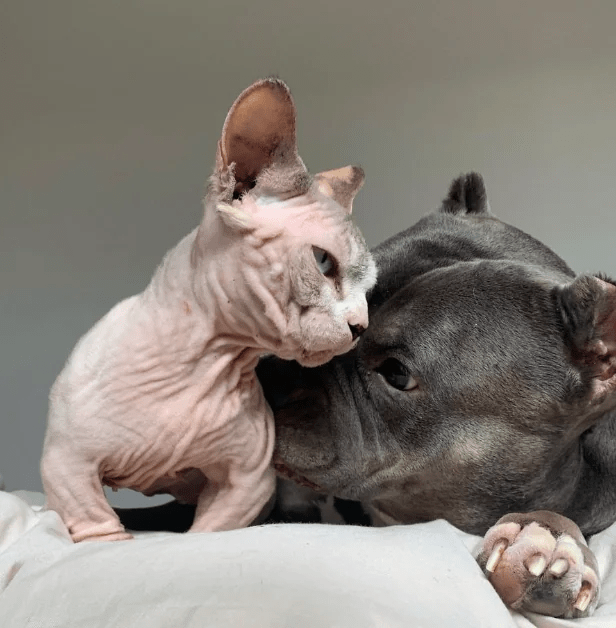
THE UK is full of animal lovers, with more than half of households having a pet.
You may have heard of hairless cats but what about bullycats? Here's everything you need to know.
What are bullycats?
Bullycats are are a type of hairless cat that are being bred around the UK.
However, not everyone is happy with this as they can be plagued by a number of health conditions.
The sphynx-like breed have short, bowed legs and lots of wrinkled skin.
The breed has got its name because of a resemblance to bully dogs.
Read more on animals
Are hairless Sphyx cats dangerous?
Hairless Spynx cats are no more dangerous than any other type of domestic cat breed.
However, bullycats are prone to several health conditions due to how they're bred.
Animal welfare charity Naturewatch Foundation said that there is a high chance they will suffer from sunburn, skin infections and problems with mobility.
The charity has said that the breed is still relatively new but eventually the fad will die out which means some of the cats will be left without a home.
Most read in The Sun
Campaign manager Natalie Harney warned: "Once the fad dies out for those breeds people will just move on to the next trend".
Dr Dan O’Neill, Associate Professor of Companion Animal Epidemiology at the Royal Veterinary College said that bullycats will have shorter lives compared to usual domestic cats.
He said: "Bullycats are likely to suffer the same shortened lives reported from a recent RVC VetCompass paper in Sphynx cats, that lived 6.7 years compared to an average of 11.7 years in cats overall.
"Deliberately selecting for disease mutations, such as hairlessness that leads to sunburn, dwarfism that leads to mobility issues and joint pain, and folded skin that leads to lifetimes of skin infections means that the lives of many bullycats will permanently be blighted by suffering."
What has the RSPCA said about the breeding of Sphynx cats?
The RSPCA has expressed their concern about the bullycat trend.
A spokesperson highlighted the fact that the way they're bred can lead to "serious welfare issues".
They said: "These exaggerated Sphynx cats are bred with very short legs which could put a strain on their joints, and they also appear to have excess skin folds making them vulnerable to skin conditions which can cause a great deal of discomfort.
"Such ailments could also result in trips to the vet leaving owners with costly vet bills too."
They explained that the cats are bred to only have a "covering of downy hair and some may not have eyelashes or whiskers" which means they are left exposed to harmful light.
They can struggle to keep warm and won't be able to use their whiskers to explore their environment.
READ MORE SUN STORIES
The spokesperson added: "We understand that their emerging presence on social media may fuel a demand for these kinds of cats but we would urge fellow cat lovers to consider adopting the many rescue cats in our care instead of buying from a breeder.
"We would also urge breeders to prioritise the health and welfare of any animal over the way they look."
Laws around deterring cats from your garden
According to the RSPCA, cats are protected by law and are free to roam meaning they might go into other people's gardens or allotments.
For many homeowners or gardeners who don't own a cat or dog, having someone else's furry friend use your outdoor space as a toilet can be extremely annoying.
But there are strict rules when it comes to trying to deter cats.
The RSPCA said: "In attempting to prevent cats from entering a garden or an allotment it is important to make sure that any deterrent methods used are non-harmful and don't cause pain, suffering, injury or distress.
"Causing unnecessary suffering to a cat is an offence under the Animal Welfare Act 2006 (AWA).
"It may also be an offence to put down snares, poison or an unlicensed
deterrent. The AWA also prohibits poisoning protected animals.
"The maximum penalty for anyone found guilty of an offence under the AWA is up to six months imprisonment and/or a £20,000 fine."










